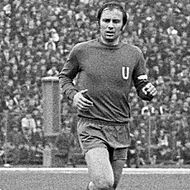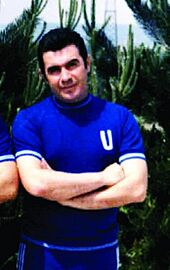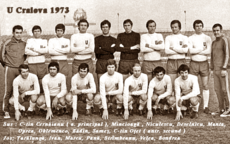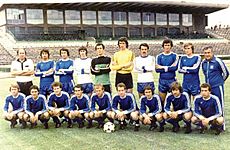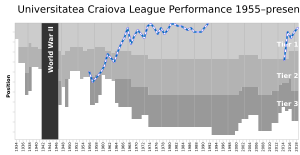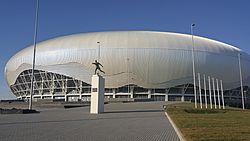CS Universitatea Craiova facts for kids
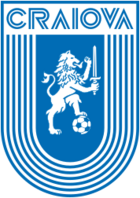 |
|
| Full name | U Craiova 1948 Club Sportiv SA |
|---|---|
| Nickname(s) |
|
| Short name | U Craiova |
| Founded |
|
| Ground | Ion Oblemenco |
| Capacity | 30,983 |
| Owners | Mihai Rotaru (95%) Adrian Andrici (5%) |
| Chairman | Mihai Rotaru |
| Head coach | Mirel Rădoi |
| League | Liga I |
| 2024–25 | Liga I, 3rd of 16 |
Universitatea Craiova is a professional football club from Craiova, Romania. People also call them U Craiova or CS U Craiova. They play in Liga I, which is the top football league in Romania.
The club started in 1948 as part of a bigger sports club called CSU Craiova. They were part of this club until 1991. During that time, Universitatea Craiova won four national league titles and five Romanian Cups. After 1991, another team, FC U Craiova, took over. However, this team faced problems and was later seen as not being the official continuation of the original club.
In 2013, the original sports club started its football team again. This new team claims the history and trophies of the first Universitatea Craiova. Many court decisions and the Romanian football league (LPF) support this. In 2018, "the White and Blues" won the Romanian Cup. This was their first trophy since the club was restarted. In 2021, they won their first Supercupa României.
On the European stage, Universitatea Craiova has done very well. They reached the semi-finals of the 1982–83 UEFA Cup and the quarter-finals of the 1981–82 European Cup. They were the first Romanian team to reach a UEFA semi-final. They are also the only Romanian team to have beaten at least one club from each of the five strongest European football countries: England, France, Germany, Italy, and Spain. "The Students" play their home games at the Stadionul Ion Oblemenco, which can hold 30,929 fans. They have strong rivalries, especially with Dinamo București.
Contents
Club History
How Football Started in Craiova (1921–1958)
Football began in Craiova in 1921. The first two teams were Craiovan Craiova and Rovine Grivița Craiova. In 1940, these two teams joined together to form FC Craiova. This team was very successful before World War II. They even won the Romanian football championship in 1942–43. However, the Romanian Football Federation (FRF) and LPF do not officially recognize this title.
In 1948, teachers and students from the new university in Craiova started CSU Craiova. This was a sports club with many different sections, including football. The football team was first called UNSR Craiova. They played their first official match on September 5, 1948, but lost 6–3.
In 1950, the football team changed its name to CSU Craiova, like its parent club. In 1953, the club was renamed Știința Craiova. A year later, in 1954, Știința was promoted to the second league for the first time. They went back down to the third league after one season and stayed there until 1958.
Universitatea Becomes Stronger (1958–1970)
In 1958, Știința was promoted to the second league again. They had a close fight for promotion against Unirea Râmnicu Vâlcea. In their first season back in the second league, Craiova finished 13th. Over the next few seasons, they improved their rankings.
In the 1963–64 season, the Students won promotion to the top league, Divizia A. This was a big moment for the club. The team was coached by Nicolae Oțeleanu.
Their first season in Divizia A was tough, but they avoided being sent back down by just one point. The next season, Știința finished eighth. They were starting to build a team that could compete for the championship.
In the summer of 1966, the club's name changed from Știința Craiova to Universitatea Craiova. But fans still often shouted "Hei, hei, hai Știința!" to cheer on their team.
The team had mixed results in the following years but always stayed in the first division. They finished third in 1966–67 and fourth in 1969–70.
The "Champion of a Great Love" (1970–1979)
In the 1970s, Craiova built a strong team with players like Ion Oblemenco, Petre Deselnicu, and Lucian Strâmbeanu. In the 1972–73 season, they finished with the same points as Dinamo București. But they lost the championship because Dinamo had a better goal difference.
This season gave them a new nickname: "the Champion of a Great Love." The poet Adrian Păunescu created this name. It meant that even though Dinamo won the title, Craiova was the true champion in the hearts of the fans.
In the 1973–74 season, Universitatea Craiova finally won the league title. They were one point ahead of Dinamo. This made them the first university team in Europe to win a national title. Dinamo was seen as the favorite team of the communist government. So, Universitatea's win was seen as a victory for pure football against unfair influences. The team was coached by Constantin Cernăianu and Constantin Oțet.
The 1974–75 season was their first time playing in the UEFA European Cup. They finished third in the league. In 1977, Craiova won the Romanian Cup for the first time. They beat Steaua București in the final.
In 1978, Universitatea won the Romanian Cup again. They finished sixth in the league. The 1978–79 season ended with them in fourth place. In the UEFA Cup Winners' Cup, they were knocked out in the first round.
Craiova Maxima (1979–1991)
Craiova Maxima (The Maximum Craiova) was the club's second golden generation. This team had many talented players who also played for the Romania national football team. Some of these players were Ilie Balaci, Rodion Cămătaru, Costică Ștefănescu, and Silviu Lung.
At the end of the 1979–80 season, Universitatea Craiova won the Romanian championship for the second time. They also played in the UEFA Cup, beating teams like Wiener SC and Leeds United.
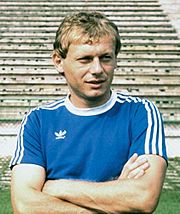
In the 1980–81 season, the team achieved a historic "double." They won both the league championship and the Romanian Cup. This success led them to the 1981–82 European Cup. There, Craiova Maxima became even more famous. They beat Olympiacos and KB, reaching the quarter-finals. They were stopped by Bayern Munich, but this was a huge achievement for Romanian football.
In the 1982–83 season, Universitatea Craiova made history again. They became the first Romanian team to reach a European Cup semi-final. They beat strong teams like Fiorentina, Bordeaux, and Kaiserslautern. In the semi-final, they played against Benfica, a very famous Portuguese team. After two draws, Benfica went to the final because of the away goals rule. In the league, Craiova finished second again.
Throughout the rest of the 1980s, Universitatea Craiova consistently finished in the top five of the league. They also played in European competitions every year. They beat teams like Real Betis, Olympiacos, AS Monaco, and Galatasaray. However, they never got past the third round. In 1985, they lost the Romanian Cup final to Steaua București.
In 1991, CS Universitatea Craiova won its last Romanian Cup and league title before a big change happened.
Changes and Rebuilding (1991–Present)
In 1991, the original CS Universitatea Craiova sports club stopped its football section. A new club, Fotbal Club Universitatea Craiova, continued playing. This club won a Romanian Cup in 1993 and reached three other finals. However, due to problems with management, they were sent down from the top league in 2005. This ended 41 years of playing in Divizia A.
In 2011, the Romanian Football Federation temporarily stopped FC Universitatea Craiova from playing. All their players became free to join other clubs.
In 2013, the local authorities in Craiova, with help from former players, restarted the football section of the original CS U Craiova. This new CS U Craiova claims to own all the history and trophies of the first Universitatea Craiova. This was confirmed by courts in 2016 and by the LPF in 2017.
On August 14, 2013, CS Universitatea Craiova was officially allowed to join the Romanian Football Federation again. They started playing in Liga II, the second tier of Romanian football. They won their first game 6–1 in the Romanian Cup. In the 2013–14 Liga II season, CS Universitatea Craiova was promoted back to Liga I after 23 years. The other team, FC U Craiova, was permanently stopped from playing, but later reappeared in 2017.
After being promoted, Universitatea finished fifth in the 2014–15 season. They finished fourth in the 2016–17 season, which meant they could play in European competitions again. In the UEFA Europa League, they played against the Italian team A.C. Milan and were knocked out.
On May 27, 2018, Universitatea won its first trophy since restarting. They beat Hermannstadt 2–0 in the Cupa României final. A month later, the club's name was officially changed to U Craiova 1948 Club Sportiv SA. As cup winners, they played in the 2018 Supercupa României, but lost 0–1 to CFR Cluj.
On August 3, 2020, Universitatea Craiova almost won their first national league title since 1991. They played against CFR Cluj, but CFR Cluj won the game 3–1 and became champions.
Home Stadiums
Old Stadionul Ion Oblemenco (1967)
The old Ion Oblemenco Stadium was a multi-purpose stadium in Craiova. It was first called Central Stadium. It was mainly used for football matches and could hold up to 25,252 people. The stadium opened on October 29, 1967, with a match between the national teams of Romania and Poland.
This stadium hosted many important matches during the Craiova Maxima era. These included the 1981–82 European Cup quarter-final against Bayern Munich and the 1982–83 UEFA Cup semi-final against Benfica. After the death of Universitatea Craiova legend Ion Oblemenco in 1996, the stadium was named in his honor. The stadium was renovated in 2008 and completely taken down in 2015.
New Stadionul Ion Oblemenco
The new Ion Oblemenco Stadium has 30,929 seats. It opened on November 10, 2017, with a friendly match between Universitatea Craiova and the Czech club Slavia Prague.
Fan Support
Universitatea Craiova has many fans in Craiova and the Oltenia region. They are the third most supported team in Romania, after FCSB and Dinamo București.
There are many fan groups, but in 2013, fans became divided. This was because it was unclear which of the two clubs was the true Universitatea. Some groups chose to support CS Universitatea Craiova, while others supported FC U Craiova. Later, in 2017, one group decided to stay neutral.
After CS Universitatea Craiova gained most of the official records, many new fan groups were formed. These include Peluza Nord Craiova: North Lions, Vechiul Spirit Ultras, Nord Oltenia, Gruppo Sibiu, Gruppo Capitala, Ponsiona and UNU MAI UNIT.
In March 2018, during a friendly game, some FC U Craiova supporters booed a CS U player. In response, CS U fans used a symbolic gesture to show their disapproval of the other group's actions.
Rivalries
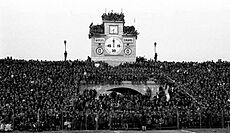
Universitatea Craiova has a big rivalry with Dinamo București. This rivalry started at the end of the 1972–73 season. Both teams had the same number of points, but Dinamo won the title because of a slightly better goal difference.
Another event that added to the rivalry happened on October 21, 2004. During a match between Craiova and Dinamo, a Craiova fan leader threw a Craiova scarf at Claudiu Niculescu. Niculescu had moved from Craiova to play for Dinamo, which fans saw as a betrayal.
Știința also has smaller rivalries with three other clubs from Bucharest: Steaua București, FCSB, and Rapid București. They also had local rivalries with teams like Extensiv Craiova and, more recently, FC U Craiova. In the 2010s, a minor rivalry started with Pandurii Târgu Jiu, another team from the Oltenia region.
Honours
Note: As of November 2017, LPF says that all Universitatea Craiova trophies won between 1948 and 1991 belong to this club. The ownership of these trophies is still debated with FC U Craiova 1948. However, a court decision from July 10, 2023, confirmed that the historical record until the end of the 1990–91 season belongs to CS U Craiova.
Domestic Competitions
- Divizia A / Liga I
- Winners (4): 1973–74, 1979–80, 1980–81, 1990–91
- Runners-up (4): 1972–73, 1981–82, 1982–83, 2019–20
- Divizia B / Liga II
- Winners (2): 1963–64, 2013–14
- Runners-up (1): 1960–61
- Divizia C / Liga III
- Winners (1): 1957–58
- Cupa României
- Winners (7): 1976–77, 1977–78, 1980–81, 1982–83, 1990–91, 2017–18, 2020–21
- Runners-up (2): 1974–75, 1984–85
- Supercupa României
- Winners (1): 2021
- Runners-up (1): 2018
European Competitions
- UEFA Cup / Europa League
- Semi-finalist: 1982–83
- European Cup / Champions League
- Quarter-finalist: 1981–82
European Competition Results
Important Wins
| Season | Match | Score | |
|---|---|---|---|
| UEFA Cup / Europa League | |||
| 1973–74 | Craiova – |
1 – 0 | |
| 1979–80 | Craiova – |
2 – 0 | |
| 1979–80 | Craiova – |
1 – 0 | |
| 1982–83 | Craiova – |
3 – 1 | |
| 1982–83 | Craiova – |
2 – 0 | |
| 1982–83 | Craiova – |
1 – 0 | |
| 1983–84 | Craiova – |
1 – 0 | |
| 1984–85 | Craiova – |
1 – 0 | |
| 1984–85 | Craiova – |
1 – 0 | |
| 1986–87 | Craiova – |
2 – 0 | |
| 1986–87 | Craiova – |
1 – 0 | |
| European Cup Winners Cup | |||
| 1977–78 | Craiova – |
2 – 0 | |
| 1985–86 | Craiova – |
3 – 0 | |
| European Cup / Champions League | |||
| 1981–82 | Craiova – |
3 – 0 | |
| 1981–82 | Craiova – |
4 – 1 | |
| UEFA Intertoto Cup | |||
| 1996 | Craiova – |
2 – 1 | |
| UEFA Conference League | |||
| 2022–23 | Craiova – |
3 – 0 | |
| 2024–25 | Craiova – |
3 – 2 | |
Players
First Team Squad
|
|
Players on Loan
|
Club Officials
League Performance History
|
|
Famous Former Players
|
|
|
Universitatea Craiova Players at Major Tournaments
2015 Africa Cup of Nations
- Cape Verde – Kay
- Cape Verde – Nuno Rocha
2024 Africa Cup of Nations
- Equatorial Guinea – Basilio Ndong
2024 UEFA European Football Championship
Famous Former Managers
Romania
 Gavril Balint
Gavril Balint Constantin Gâlcă
Constantin Gâlcă Gheorghe Mulțescu
Gheorghe Mulțescu Eugen Neagoe
Eugen Neagoe Victor Pițurcă
Victor Pițurcă Laurențiu Reghecampf
Laurențiu Reghecampf Emil Săndoi
Emil Săndoi
Bulgaria
Greece
Italy
Images for kids
See also
 In Spanish: U Craiova 1948 Club Sportiv para niños
In Spanish: U Craiova 1948 Club Sportiv para niños


